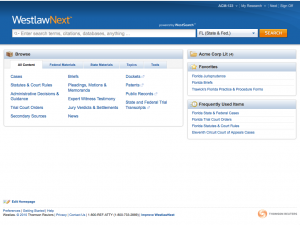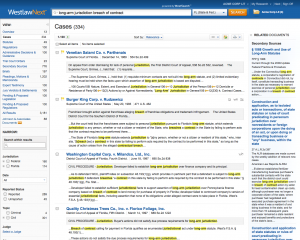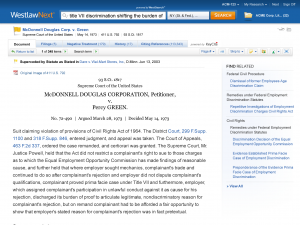Last week I was at West’s headquarters in Eagan, Minnesota, with a dozen or so journalists and bloggers, attending a series of presentations on WestlawNext, the next generation of Westlaw. After some five years of development, it’s being launched today. Others who were in Eagan with me have already offered their thoughts on WestlawNext. I now do so.
And I do so even though transactional lawyers don’t represent the core users of Westlaw. (That’s been my assumption, and responses to the polls in this recent blog post appear consistent with that.) So regular readers of this blog might not find WestlawNext of compelling interest. But I use Westlaw a lot, so indulge me if I go slightly off message for this post.
WestlawNext’s Home Page
The biggest change offered by WestlawNext is evident at the home page (see the screenshot below).
Westlaw’s current home page offers you the main search box plus a range of others, among them “Find by citation” and “KeyCite this citation.” It also asks you to specify which of Westlaw’s 40,000-plus databases you wish to search and offers you a few dozen to choose from. By contrast, WestlawNext offers one search box into which you type your search, whatever it might be, without asking you to specify a database. The obvious analogy is Google.
The home page could conceivably have been limited to that search box, but after exhaustive customer research West elected for a compromise between utter austerity and the current Westlaw approach: you can restrict your search by jurisdiction, and by clicking on one of the limited number of links below the search box you can instead elect to go directly to whatever kind of materials, topics, or tools interest you.
Searching
You can search on WestlawNext using “natural language” or by using Boolean terms and connectors. But a natural-language search on WestlawNext is much more sophisticated than a natural-language search on Westlaw. For one thing, that’s because WestlawNext’s search algorithms leverage West’s extensive proprietary analytical content, notably the West Key Number system. If two cases are grouped together in the Key Number system, a WestlawNext search that retrieves one of the cases will take that grouping into account in determining whether to include the other case. Similarly, WestlawNext searches also consider KeyCite citation links between documents.
I found it particularly intriguing that in handling a given search, WestlawNext also considers customer usage with respect to comparable searches. More specifically, it looks to “meaningful interactions.” If a customer looked at a given document retrieved in a search, that’s not especially meaningful. But if the customer printed the document, or saved it to a folder, that would increase the odds that the document was particularly relevant for purposes of a similar search performed subsequently. When amassed over thousands upon thousands of searches, that sort of incremental information should add real value.
This enhanced searching means that documents retrieved in a given search aren’t purely a function of the search terms. For example, different states use different terminology when referring to drunk driving; if your search refers to “driving under the influence,” WestlawNext is designed to retrieve cases in which the court uses a different term, such as “driving while impaired.” In fact, WestlawNext will retrieve relevant cases even if you misspell a search term, and it will also likely ask you whether you in fact meant, for example, “Brown v. Board of Education” rather than “Brawn v. Board of Education.”
To distinguish WestlawNext’s enhanced search function, West has dubbed it “WestSearch.” You get the benefit of WestSearch even if you elect to use Boolean terms and connectors. That can be a bit disconcerting to those who are used to such searches on Westlaw: if you use quotation marks to designate a search phrase, WestSearch will nevertheless retrieve, if it thinks them particularly relevant, documents that contain the phrase elements used separately. I asked West whether it expects Boolean searching to fall by the wayside, but they said they did not—that if you’re looking for something very specific, a Boolean search may be the best way to retrieve it. They suggested that in due course they may add an “advanced search” function that would allow the user to perform a pure, un-WestSearch-enhanced Boolean search.
The Overview Page
Because WestlawNext is structured to allow you to perform a search without specifying a database, search results include anything relevant retrieved by WestSearch from all databases. WestlawNext first presents those results on an overview page containing a link to, and a brief extract of, the few documents deemed most relevant, ranked by relevance. (See the screenshot below.) They would come from one or more of the various categories (cases, statutes, regulations, secondary sources, and so on). You can go directly to one of those documents, or you can elect to see all documents in a given category. You can also specify which category you want to appear first.
To the left of the overview is a list of how many documents have been retrieved in each category. Clicking on that list provides another way to get to all the documents in a category.
Documents
In WestlawNext, documents look sharper and are easier to read—the result of West’s exhaustive customer research. (See the screenshot below.) It’s no surprise that Arial won out for the body text, even though it’s no thing of beauty: when it comes to typography, people like what they’re used to.
One nice feature new to WestlawNext is that when you’re in a document, you can highlight text and elect to save it to a folder, you can copy text with a reference specifying the document the text came from, or you can add a note to the document. If you’ve taken any of those actions in a given document in the previous 30 days, that will be indicated by one or more of three symbols to the right of the overview entry for that document.
Folders
You can save documents and copied text to “folders.” (Folders don’t contain the documents themselves but rather links to the documents.) Using folders provides users with a simple way to organize search results, but more important is the fact that all links are kept up-to-date, so any time you view a document in one of your folders you can quickly check for any changes in its subsequent history and how it has been cited since you last viewed it.
West told us that at launch users won’t be able to share folders; that functionality will be added after launch. Users within an organization, or among organizations, will then be able to share search results, as long as each user is covered by a WestlawNext plan.
Pricing
In WestlawNext, searches would be covered by your plan. Whether you’d be charged for viewing or printing a document or saving it to a folder would, I gather, depend on what’s covered under your plan. If you save a document to a folder, during the following year you wouldn’t be charged for viewing that document again. (If you share a folder, other users would be charged for viewing any document in that folder, and then they too would have a year to view it without incurring any additional charges.)
In terms of absolute pricing, West would only say that WestlawNext will be charged at a “modest premium” to current Westlaw pricing, with the price for each Westlaw customer to be determined in discussions between that customer and its West representative. As I understand it, the premium is not necessarily a function of how user actions are priced. It may be that the premium comes in the form of a requirement that a given user beef up their plan by adding users or databases.
The Payoff
So what benefits does WestlawNext offer?
Allowing users to search without specifying a database means that a user will be supplied with all relevant documents, wherever they might be stashed. You won’t risk missing a document because you weren’t aware of a given database, or didn’t know that it would be relevant.
The enhanced searching results in searches that retrieve a greater number of relevant documents and place them higher in the search results. That makes searches not only more successful, but also faster, as fewer searches are required. West showed us a scary graphic of a representative series of searches on Westlaw: the user retrieved relevant documents, but because they were buried lower in the results, the user missed some relevant documents and instead elected to do another search, a process that was repeated a number of times. Presenting relevant documents higher up the search results reduces the likelihood of such futility.
Being able to highlight or copy text, add notes, and save documents to folders that you’ll be able to share (once WestlawNext rolls out that function) makes the whole search process more efficient. The same goes for the graphic-design enhancements.
Dumbing Down?
During our presentations, West mentioned that it had heard squawking in some circles to the effect that enhanced natural-language searching, plus the fact that WestSearch’s default mode is not to follow Boolean searches slavishly, means that WestlawNext represents a “dumbing-down” of legal search.
Here’s my take on that: If you’re a Boolean-search wizard, the transition might be disconcerting: you’re ceding control to the unknowable algorithms of WestSearch on the assumption that the enhanced searching will routinely produce greater results than you could achieve with your Boolean artistry. My limited exposure to WestlawNext suggests that it’s worth it to cede that autonomy.
But consider this from West’s perspective. The boolean-search wizards among us are greatly outnumbered by searchers who are busy, stressed, not very experienced, or unfamiliar with the topic being searched, or some combination of those factors. They’re the ones who are most subject inefficiencies on Westlaw, and I suspect that they’d be only too happy to surrender some autonomy for the prospect of quicker searches and more relevant results.
Market Response?
I have no idea to what extent West will convince Westlaw customers to pay a premium for WestlawNext. I suspect that among larger customers, market psychology will ensure that no one will want to be seen to be relying on yesterday’s search technology.
And I won’t speculate how WestlawNext will match up against—ranked in order of plausibility—the next generation of Lexis, less-expensive services such as Fastcase, and Google Scholar. I’m fortunate not to have to consider pricing, as free Westlaw and Lexis searching is a perk of my teaching at Penn Law. Once Penn Law hands out WestlawNext passwords—sometime in fall 2010, as rollout at law schools is purposely being delayed—I anticipate that I’ll do the bulk of my searching through WestlawNext. I’m prepared for a bit of a learning curve, but I’m looking forward to it.
Links
You might find of interest the views of some of those who were with me in Eagan. Each of the following links will take you to that person’s blog post on WestlawNext:
- David Bilinsky
- Tom Boone
- Simon Chester
- Jason Eiseman
- Carolyn Elefant
- Greg Lambert
- Besty McKenzie
- Lisa Solomon
- Jason Wilson
And of course, there’s the official WestlawNext site.
Disclosure
West footed the bill for my trip to Eagan. And I do public seminars and webcasts with another part of the West family, West LegalEdcenter. But it would take more than that to make me a West stooge! I recall, as a sign of my independence, one of the oddest bits of feedback I received after a seminar: the participant in question was disconcerted that, at a seminar offered by West, I mentioned Lexis a couple of times. That’s me—a mavericky rogue.



